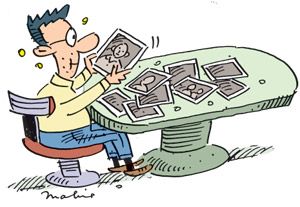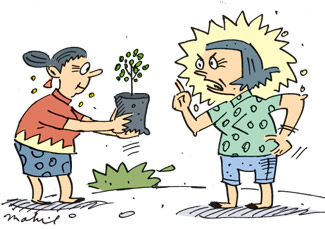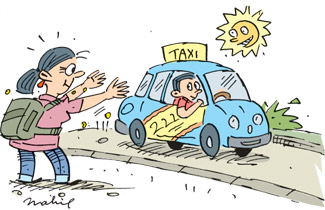|
 by
R. S. Karunaratne by
R. S. Karunaratne
How to use 'sort'
in speech and writing
'Sort' can be used as a noun, verb and an adverb. The meaning
differs. As a noun it means 'type' or 'kind'. As a verb it means
'arrange things'. As an adverb it means 'a little' or 'more or less'.
1. 'Sort' is used to talk about a
class of people or things.
I don't like green tea. Do you have another sort?
|

I sorted through the
photographs to find one of my grandfather. |
What sort of films do you see?
This is my sort of hotel.
We both like the same sort of food.
What sort of clothes do you need?
There are all sorts of animals in the zoo.
This sort of pen is very expensive.
I don't like plants of this sort .
2. 'Sort' is used to describe people
or things or events inexactly.
A : What's John like?
B : He's sort of short and fat.
A : What's the weather like?
B : It's sort of warm.
A : Are you ready yet?
B : Sort of
3. Collocations
Some adjectives are frequently used with 'sort'
What's the best sort of camera?
He was polite, in an odd sort of way.
This is the worst sort of city to live in.
She provided me with the right sort of food during my stay.
|

I donít like plants of this sort . |
We were given some wrong sort of advice.
Joe is a funny sort of fellow.
I met a strange sort of passenger.
4. 'Sort' is used in certain phrasal
verbs.
He asked me to sort out the material (organise)
Your problem will sort itself out. (stop being a problem without
anybody's help)
I sorted through the photographs to find one of my grandfather.
5. Set phrases
The hotel serves a breakfast of sorts. (not a good one)
That sort of thing cannot be avoided. (something that happens
generally)
I can't do anything creative today.
I am just out of sorts. (slightly ill or unhappy)
It is a sort of pale green colour. (in some way)
It takes all sorts to make a world. (This is a saying that means
"people have different characters, opinions and abilities)
Sorting office is a building where letters and parcels are put into
groups according to their addresses.
Test of vocabulary
This test is meant to increase your vocabulary. Just tick off "yes"
or "no" and check your answers with the key.
1. Is laconicism characteristic of a verbose speaker? Yes... No....
2. Does a magniloquent speaker use short, simple words? Yes....
No.....
3. Does a frog evolve from a tadpole? Yes..... No....
4. Is an eloquent speaker interesting to listen to? Yes... No...
5. Do verbose people use a lot of verbiage? Yes.... No...
6. Is volubility characteristic of an inarticulate person? Yes...
No...
7. Does verbosity show a careful and economical use of words? Yes...
No...
8. Is a verbal person usually inarticulate? Yes... No....
9. Is a magnum opus one of the lesser works of a writer, artist, or
composer? Yes.... No....
10. Is a magnanimous person selfish and petty-minded? Yes... No.....
Explanations
1. Laconism: use of very few words
Verbose: using more words than are needed
2. Magniloquent: using high flown or bombastic language
3. Evolve: develop gradually
4. Eloquent: clearly expressive
5.Verbiage: excessively lengthy or technical speech or writing
6. Volubility: incessant or fluent speech
7. Verbosity: use of more words than are necessary
8. Verbal: oral
9. Magnum opus: a work of art, music or literature that is regarded
as the most important or best work that an artist, composer, or writer
has produced.
10. Magnanimous: generous or forgiving, especially towards a rival or
less powerful person.
**********
Key:-
1. No, 2. No, 3. Yes, 4. Yes, 5. Yes, 6. No, 7. No, 8. No, 9. No, 10.
No.
**********
Starters :
Use of 'a,
an, the'
With countable and uncountable nouns:
Nouns that can be counted are countable nouns. Those that cannot be
counted are uncountable nouns. Remember that an uncountable noun does
not have a plural form.
1. Use 'a' or 'an' before countable
nouns.
He carried an umbrella because it was raining.
I saw a boy running away from the classroom.
|

She hailed a taxi to reach
her destination. |
She hailed a taxi to reach her destination.
An apple a day keeps the doctor away.
A teacher should always update his knowledge.
An aunt of mine died last week.
2. Do not use 'a' or 'an before
uncountable nouns.
We use flour to make hoppers.
She added salt to the dhal curry.
There is water in the well.
Children love to eat sugar.
3. Use 'a' or 'an' when an
uncountable noun is used along with a countable noun.
Drink a glass of water as soon as you get up.
She used a cup of flour to make pancakes.
Just add a teaspoon of salt to the brinjal curry.
I saw him carrying a can of oil.
Can you buy me a bottle of ink?
She gave me a plate of rice.
4. Use 'the' with uncountable nouns
when it is clear to the reader or listener which things you are
referring to.
The water in this bottle is for drinking.
The flour we use to bake cake comes from the United States.
The tea you bought yesterday is not good.
5. 'Some' can be used with both
countable and uncountable nouns.
She bought some apples for her children.
I need some paint to finish this job.
He brought some paper to wrap the gifts.
She served me some rice and curry.
Some people do not read books.
There is some oil in the can.
I bought some books at the exhibition.
Put some ink into this fountain pen.
Some trees live longer than human beings.
You need some confidence to pass examinations. |

